最新高一必修三语法(名词性从句)
- 格式:doc
- 大小:55.00 KB
- 文档页数:8
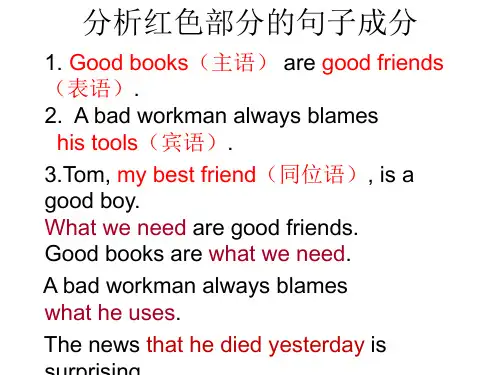

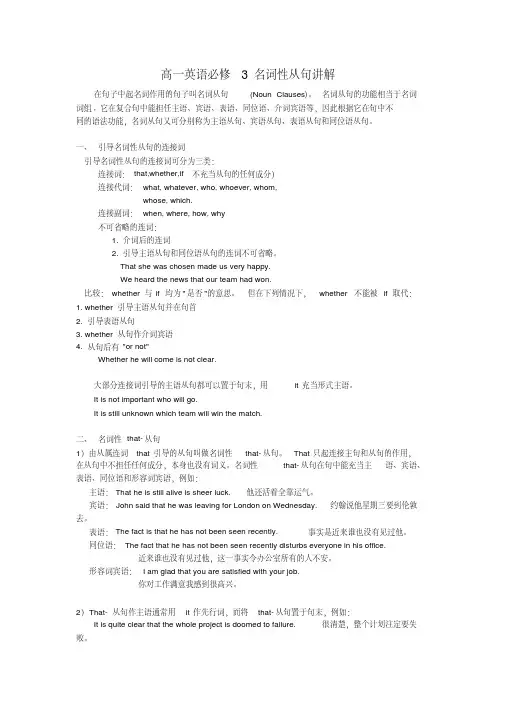
高一英语必修3名词性从句讲解在句子中起名词作用的句子叫名词从句(Noun Clauses)。
名词从句的功能相当于名词词组, 它在复合句中能担任主语、宾语、表语、同位语、介词宾语等,因此根据它在句中不同的语法功能,名词从句又可分别称为主语从句、宾语从句、表语从句和同位语从句。
一、引导名词性从句的连接词引导名词性从句的连接词可分为三类:连接词:that,whether,if 不充当从句的任何成分)连接代词:what, whatever, who, whoever, whom,whose, which.连接副词:when, where, how, why不可省略的连词:1. 介词后的连词2. 引导主语从句和同位语从句的连词不可省略。
That she was chosen made us very happy.We heard the news that our team had won.比较:whether与if 均为"是否"的意思。
但在下列情况下,whether 不能被if 取代:1. whether引导主语从句并在句首2. 引导表语从句3. whether从句作介词宾语4. 从句后有"or not"Whether he will come is not clear.大部分连接词引导的主语从句都可以置于句末,用it充当形式主语。
It is not important who will go.It is still unknown which team will win the match.二、名词性that-从句1)由从属连词that引导的从句叫做名词性that-从句。
That只起连接主句和从句的作用,在从句中不担任任何成分,本身也没有词义。
名词性that-从句在句中能充当主语、宾语、表语、同位语和形容词宾语,例如:主语:That he is still alive is sheer luck.他还活着全靠运气。
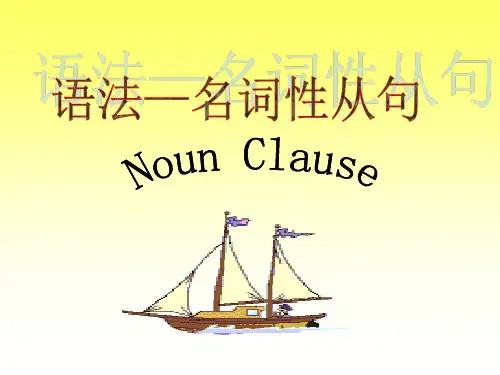
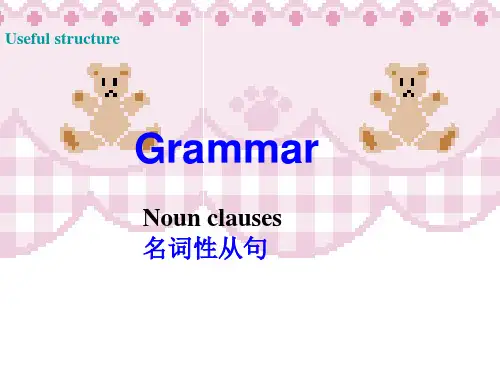
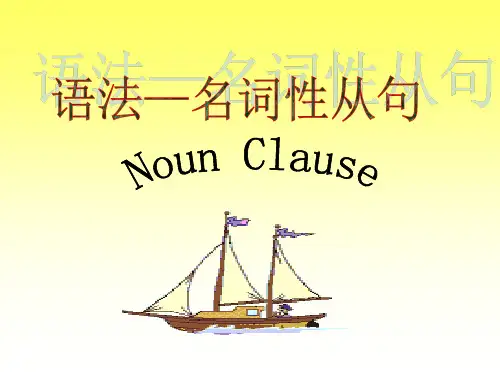
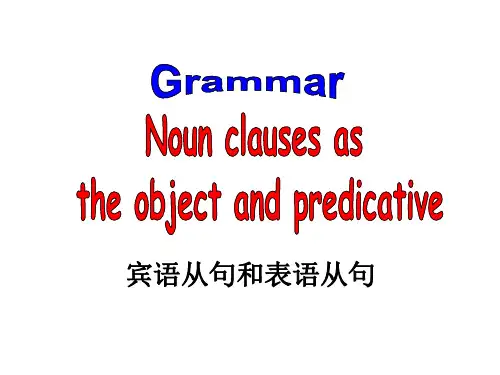
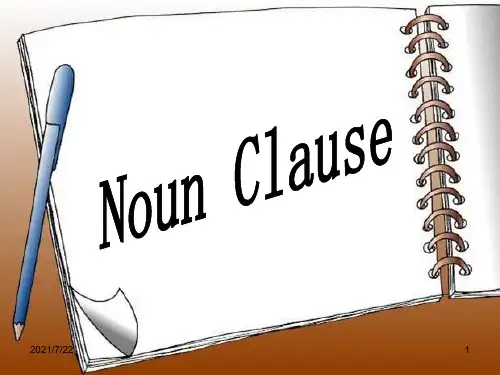

精品文档 精品文档 必修3 语法 Unit 1& Unit 2 Modal verbs情态动词(讲解详见P91—94) 1. 情态动词的语法特征: 1) 情态动词不能单独做谓语, 除ought和have外, 后面只能接不带to的不定式。 2) 情态动词没有人称, 数的变化, 但有些情态 动词, 如can, will也有一般式和过去式的变 化。 3)只作情态动词的: can / could, may / might, ought to, must 可情态可实义的: need, dare 可情态可助动词的: shall / should, will /would 相当于情态动词的: have to, used to 2. 情态动词: can & could, may & might, will & would, shall & should, must/ can, ought to & ought not to, have to & don’t have to, mustn’t & needn’t等 注意事项: 1. can 和 could 接动词的完成形式,表示可能已经做某事。can 用在否定和疑问句中, 表示不相信、怀疑等态度。Could have done 表示本可以做的事情但却没有做 e.g. They can’t have gone out because the light is still on. 2. 以could或would提问时,不能再以could或would作答,而应该用can或will。如: — Could I borrow your dictionary? — Yes, of course you can. 3. shall 可以用于第一、三人称的疑问句,表示征求意见或许可;还可用于第二、三人称的陈述句中,表示允诺、警告、命令或威胁等。如: You shall be punished if you break the rule. 4. should 表示义务、建议、劝告,意为 “应该”。 “should + have + 过去分词表示本应该在过去做但没有做。 e.g. You should keep your promise. 你应该遵守诺言。 She should have passed the exam. 她应该通过考试的。 5. must 用于一般问句中, 肯定回答用 must 否定式用 needn’t 或 don’t have to,做 “不必”, mustn’t 表示“禁止,不允许” — Must I finish all assignments at a time? — Yes, you must. No, you needn’t. must 表示“偏要, 硬要”, 指做令人不快的事情。 Eg: He must come and worry her with question, just when she was busy cooking the dinner. Of course, after I gave her my advice, she must go and do the opposite. 练一练: 一、选择。 1. I ______ worry about my weekend — I always have my plans ready before it comes. A. can’t B. mustn’t C. daren’t D. needn’t 精品文档 精品文档 2. — How’s your new babysitter? — We ______ ask for a better one. All our kids love her so much. A. should B. might C. mustn’t D. couldn’t 3. — May I take this book out of the reading room? — No, you ______. You read it in here. A. mightn’t B. won’t C. needn’t D. mustn’t 4. When I was young, I was told that I ____ play with matches. (上海2008春) A. wouldn’t B. needn’t C. mustn’t D. daren’t 5. Some aspects of a pilot’s job ____ be boring, and pilots often _____ work at inconvenient hours. A. can; have to B. may; can C. have to; may D. ought to; must 6. — Shall I inform him of the change of the schedule right now? — I am afraid you _____, in case he comes late for the meeting. A. will B. must C. may D. can 7. It _____ be the postman at the door. It’s only six o’clock. A. mustn’t B. can’t C. won’t D. needn’t 8. — I haven’t got the reference book yet, but I’ll have a test on the subject next month. — Don’t worry. You _____ have it by Friday. A. could B. shall C. must D. may 二、用适当的情态动词翻译句子。 1. 你应该更加注意你的书写。(pay attention to)
2. 明天早晨,我们必须早起。 3. 我本应该完成作业的,但昨晚我熬夜看足球赛了。(stay up late) 4. 司机酒后严禁开车。 5. 你不必太担心你的作文。 Unit 3 —5 名词性从句noun clauses 1. 名词性从句定义:在句子中起名词作用的句子叫名词从句。 (Noun Clauses) 2. 名词从句的功能相当于名词词组, 它在复合句中能担任主语、宾语、表语、同位语等。 3. 因此根据它在句中不同的语法功能,名词从句包括:主语从句、宾语从句、表语从句和同位语从句。 1)What he does is important. 2) I don’t like what he does everyday. 精品文档 精品文档 3) This is what he does everyday. 4) I don’t know about the fact that he is a teacher. 4. 名词性从句中的连接词有: 连词: that / whether / as if (though) 连接代词: what /who/which / whose / whatever / whoever / whomever / whichever 连接副词: where / when / why / how / wherever / whenever
Unit 3 名词性从句作宾语、表语(宾语从句&表语从句)
1. 宾语从句: 1)定义:跟在动词或介词后面的从句叫宾语从句。 2)引导宾语从句的连接代词主要有: who, whom, what, which, whatever, whoever 等;连接副词主要有:where, when, how, why 等; 连词主要 有that, if, whether。 3) that 在引导宾语从句时无词义,也不充当任何成分,且通常可以省略。但如果含有两个或两个以上的并列宾语从句时,通常只有第一个从句的that可以省略,其余从句的that一般不能省略。如: My uncle said (that) he would come and that he would also bring his son. 宾语从句中的连接词that在以下三种情况下不能省略: ① 当that 从句与另一名词性从句并列作宾语时, 第二个that不能省; ② 当that作介词宾语时, that不可省掉。 The reason lies in that she works harder than the others do. ③ 用it做形式宾语的宾语从句,把真正的宾语从句后置 I think it necessary that you should read English aloud. 5) whether 和 if 都意为“是否”,通常情 况下,二者都可以引导宾语从句;但在介词之后或与 or not 连用时,只能用whether。 6) 在第一人称 I, we 与动词 think, expect, believe, guess, suppose 等连用,后接宾语从句时,通常将从句的否定转移到主句谓语动词,形成否定前移。如: I don’t suppose you’re used to this diet. 7)一些含有假设、猜想、建议等意思的 动词后面的宾语从句要用“should +动词原形”结构(虚拟语气), should 可以省略。这类 动词有: advise, arrange, command, demand, desire, insist, order, propose, require, request, suggest等。如: I suggested that he (should) study harder. 2. 表语从句 1)定义: 跟在系动词后面的从句叫表语从句 2)系动词:be, like, get, become, turn, keep, remain, grow, smell, look, sound, sense, feel, taste等。 3)that 引导表语从句,只起连接作用,没有意义,不作句子成分,但不可省(三不原则)。引导表语从句的连词有 that, whether, as if。引导表语从句的连接代词有 what, who, which。引导表语从句的连接副词有when, where, how, why。 Eg: What I want to say is that we should spare no efforts to protect our environment. 4)当主句的主语为 reason 或是由 why 引导的主语从句时,与它相关的表语从句的连词要用 that 而不能用because。 The reason why I like books is that it can broaden our horizon.